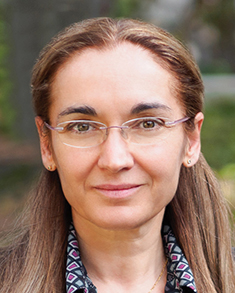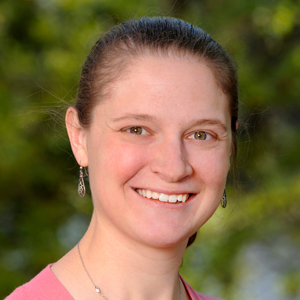Nogales shows ‘bold’ use
of cryo-electron microscopy
Eva Nogales at the University of California, Berkeley, has won the American Society for Biochemistry and Molecular Biology’s Mildred Cohn Award in Biological Chemistry for her revolutionary application of structural biology to molecular-level insights of essential large multiprotein complexes. The Cohn award honors scientists who have utilized physical approaches to make substantial advances in understanding biological chemistry.

Nogales is one of the preeminent leaders in the field of cryo-electron microscopy, or cryo-EM. Robert Tjian at the Howard Hughes Medical Institute wrote in support of Nogales’ nomination: “She has been bold, innovative and rigorous in applying negative stain and cryo-EM to solving 3-D structures of very challenging biological macro-molecules.” In his letter of support for Nogales’ nomination, Carlos Bustamante, Nogales’ colleague at Berkeley, said, “I can think of very few other scientists whose work has deepened and broadened our knowledge to anywhere near the same extent as Eva’s achievements have done.”
Nogales was trained as a physicist. She earned her bachelor’s degree in physics at the Universidad Autonoma de Madrid in Spain and completed her Ph.D. in biophysics in the physics department of Keele University in the U.K.
It was as a postdoctoral fellow in the laboratory of Kenneth Downing at the Lawrence Berkeley National Laboratory that Nogales made her first significant contribution to the field of structural biology. She used electron crystallography to generate an atomic structure of alpha and beta tubulin. This was not only an important advance for the field of cell biology but also a landmark achievement in structural biology, since alpha and beta tubulin had been resistant to X-ray crystallographic approaches. Microtubules and their interactions with other proteins have remained an important focus of Nogales’ research. She has published several seminal papers describing the structural basis of the complex dynamics of microtubules and their interactions with important regulatory proteins.
“Her work has been at the forefront of microtubule cytoskeleton research and has set Eva apart in the whole macromolecular EM field,” said Kenneth Downing, Nogales’ postdoctoral mentor at Lawrence Berkeley National Laboratory. “There is no question that she is recognized throughout the EM-structural biology community as one of its rising stars and leaders.”
Robert Glaeser of the University of California, Berkeley, emphasized Nogales’ many important contributions beyond her work on the cytoskeleton. “Prof. Nogales is a structural biologist of extraordinary accomplishment. She has made major contributions in several different topics of protein structure and function,” he said. Through continued refinement and development of advanced techniques, Nogales has been able to generate numerous impressive high-resolution structures of important multiprotein complexes including the CRISPR-associated complex, the 26S proteasome and the human transcription preinitiation complex.
Nogales is a Howard Hughes Medical Institute investigator and a member of the National Academy of Sciences. She has received the Protein Society’s Dorothy Crowfoot Hodgkin Award and the American Society for Cell Biology’s Early Career Award.
Watch Nogales’ award lecture, “Atomic structures of microtubules in different states: towards a mechanistic understanding of dynamic instability,” below.
Enjoy reading ASBMB Today?
Become a member to receive the print edition four times a year and the digital edition monthly.
Learn moreGet the latest from ASBMB Today
Enter your email address, and we’ll send you a weekly email with recent articles, interviews and more.
Latest in People
People highlights or most popular articles

2026 ASBMB election results
Meet the new Council members and Nominating Committee member.

Simcox wins SACNAS mentorship award
She was recognized for her sustained excellence in mentorship and was honored at SACNAS’ 2025 National Conference.

From humble beginnings to unlocking lysosomal secrets
Monther Abu–Remaileh will receive the ASBMB’s 2026 Walter A. Shaw Young Investigator Award in Lipid Research at the ASBMB Annual Meeting, March 7-10 in Washington, D.C.

Chemistry meets biology to thwart parasites
Margaret Phillips will receive the Alice and C. C. Wang Award in Molecular Parasitology at the ASBMB Annual Meeting, March 7-10 in Washington, D.C.

ASBMB announces 2026 JBC/Tabor awardees
The seven awardees are first authors of outstanding papers published in 2025 in the Journal of Biological Chemistry.

Decoding how bacteria flip host’s molecular switches
Kim Orth will receive the Earl and Thressa Stadtman Distinguished Scientists Award at the ASBMB Annual Meeting, March 7–10, just outside of Washington, D.C.

